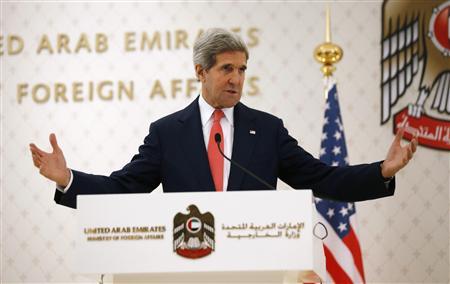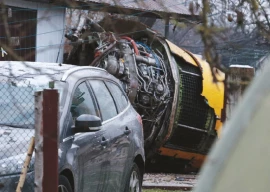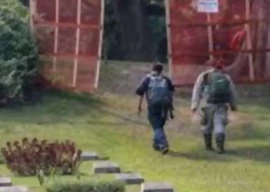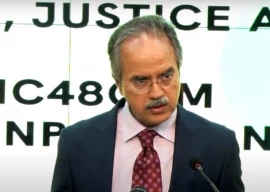
In a further indication of cooperation, the United Nations nuclear watchdog reached an agreement under which Iran will grant UN inspectors access to more nuclear facilities.
Iran and six world powers - the United States, Britain, Russia, France, China and Germany - came close to a preliminary nuclear agreement at the weekend during talks in Geneva and decided to resume negotiations on November 20 in their attempt to defuse a decade-old standoff.
"This is not a race to complete just any agreement," Kerry told a news conference during a visit to the United Arab Emirates. However, he added: "Through diplomacy we have an absolute responsibility to pursue an agreement."
While saying that a deal with Iran was expected within months, Kerry tried to reassure Washington's Arab allies and Israel that his country would not abandon them.
Thumping the podium to make his point, Kerry said President Barack Obama had said "that he will continue to defend his friends and allies in this region, the UAE, Saudi Arabia, others, he will defend them against any external attack.
"That is the promise of the United States and as I stand here as Secretary of State, as long as I'm Secretary of State, that is also our policy, my policy, representing the President of the United States in executing it."
The fact that a deal might be within reach after a decade of confrontation between Iran and Western powers shows the shift in the tone of Tehran's foreign policy since President Hassan Rouhani was elected in June.
Rouhani began diplomatic moves towards a nuclear deal in order to ease sanctions that have throttled Iran's vital oil industry and cut it off from the international banking system.
On the table initially is phased, limited and reversible relief from sanctions. Iran, however, wants an early lifting of the oil and banking sanctions.
Britain and Iran said they were reviving diplomatic ties two years after a mob of students attacked the British embassy in Tehran. Both sides said they were appointing a new charge d'affaires.
Britain closed the embassy in 2011 after a rally against British sanctions escalated into violence and protesters scaled the walls, ransacked offices and burned buildings.
Major Powers
But with a breakthrough in Geneva tantalisingly close, divisions within the powers emerged when France declined to endorse the proposal, believing it did not do enough to neutralise the risk of an Iranian atom bomb.
French Foreign Minister Laurent Fabius nonetheless expressed hope on Monday that a deal could be reached, although he said Tehran still had to make an effort on a few points.
"We are not far from an agreement with the Iranians, but we are not there yet," he told Europe 1 radio. "I am hopeful we will reach a good deal. We want an accord that ensures regional and international stability."
Fabius said Iran must suspend construction of its Arak heavy-water reactor and halt uranium enrichment to a concentration of 20 percent to win a relaxation of the sanctions, a position long held by Paris.
Some diplomats accused France of grandstanding during the talks at the weekend, which Fabius denied, saying Paris was not isolated but had an independent foreign policy.
Kerry denied reports of rifts among the powers and suggested Iran was not ready to accept the plan at that point.
The powers were "unified on Saturday when we presented a proposal to the Iranians, and the French signed off on it, we signed off on it, and everybody agreed it was a fair proposal. There was unity, but Iran couldn't take it at that particular moment, they weren't able to accept that particular thing."
A senior western diplomat said, however, that not only the French but other members of the big powers believed the deal was not yet ready despite "very intensive, very complex, very detailed and constructive negotiations".
"The collective assessment of the group was that some more time would still be needed. That was not just the assessment of the French," the diplomat told reporters.
Joint Statement
In deal agreed on Monday aimed at improving transparency in Iran's nuclear programme, Tehran will grant UN inspectors "managed access" to a uranium mine and a heavy water plant within three months.
Under the technical accord signed by UN nuclear agency chief Yukiya Amano in Tehran, Iran will also provide information about planned new research reactors and sites for future nuclear power plants, as well as clarify earlier statements about additional uranium enrichment facilities.
The IAEA and Iran have agreed "to strengthen their cooperation and dialogue aimed at ensuring the exclusively peaceful nature of Iran's nuclear programme," a joint statement distributed in Vienna said.
The deal will allow inspectors access to the Gchine uranium mine and the Arak heavy water production plant.
On the diplomatic front, Iran and the six powers are searching for a preliminary agreement that would cap Iran's nuclear capacity and open up the programme to UN inspectors. In exchange, they have offered some relief from sanctions, which Iran says does not go far enough.
Under discussion is a temporary deal entailing a freeze to higher-grade uranium enrichment - which Iran bills as fuel for a medical research reactor but which is also potential material for bombs - lasting about six months.
During that time, Iran and the six powers would negotiate a permanent agreement aimed at ensuring that none of Iran's nuclear activities could be diverted towards bomb-making. Tehran says its nuclear programme is entirely peaceful.
COMMENTS (1)
Comments are moderated and generally will be posted if they are on-topic and not abusive.
For more information, please see our Comments FAQ


1732519298-0/BeFunky-collage-(85)1732519298-0-165x106.webp)
1732611352-0/lamar-(5)1732611352-0-165x106.webp)
1732610018-0/BeFunky-collage-(91)1732610018-0-165x106.webp)












Who does Mr Kerry think he is kidding? The US is just a colony of Israel, and Israel does not wish to have an agreement with Iran.